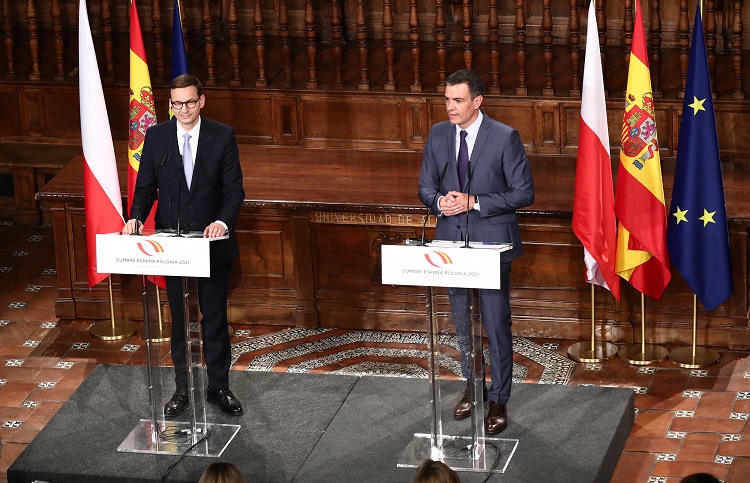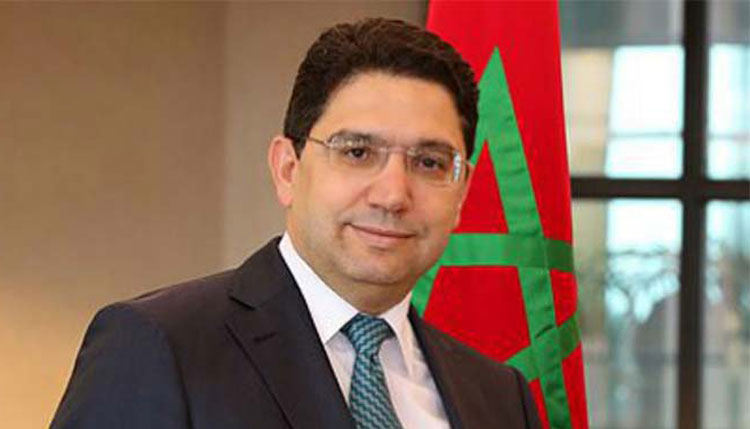Eduardo González
The XIII High Level Meeting (HLM) between Spain and Poland concluded yesterday with a Joint Declaration in which both countries highlighted the role of the EU in the recovery after the COVID-19 crisis, supported the “territorial integrity of Ukraine” and democracy and human rights in Belarus, and addressed their strong disagreements on migration issues with an ambiguous call to “continue advancing in the negotiations on the New Pact on Migration and Asylum” taking into account “the particular situation of each Member State”.
The summit, the first since the one held in Warsaw in 2017, was held in Alcalá de Henares (Madrid) and was chaired by the two heads of government, Pedro Sánchez and Mateusz Morawiecki. It was also attended by almost half of the Executive (the Second Vice-President for Economic Affairs, Nadia Calviño; the Third Vice-President for Labor, Yolanda Díaz; the Fourth Vice-President for Ecological Transition, Teresa Ribera; the Minister of Foreign Affairs, Arancha González Laya; the Minister of the Interior, Fernando Grande-Marlaska; the Minister of Transport, José Luis Ábalos; and the Minister of Industry, Trade and Tourism, Reyes Maroto) and their corresponding Polish counterparts.
During the meeting, according to Moncloa, Sánchez and Morawiecki showed “the good relationship existing between their governments, with different political approaches in some matters”, but with “a great coincidence regarding the management of the pandemic and the recovery, the green and digital transitions, the demographic challenge and the extensive rural area”. They also addressed “current European issues, such as social policy, climate and the new migration pact”.
According to Sánchez, during the joint press conference with his Polish counterpart, the Summit allowed “to seek synergies in the respective national recovery plans to resume the path of growth and economic and social recovery, facing the important challenge of green and digital transitions”. Likewise, he continued, the two governments addressed the need to “strengthen the EU’s relationship with its Eastern neighbors” and to “match the level of ambition” with respect to the Southern Neighborhood, and shared “the commitment to transatlantic security as NATO partners and a common space, the European Union, in which we do not always have the same vision, but in which we converge in some important debates such as the necessary boost to recovery, a just transition and the defense of the internal market and cohesion policy”.
All these ideas were embodied in a final Declaration in which, among other issues, the two governments affirm that the European Union constitutes “the best means to defend the values, freedoms and interests of our citizens, and to respond to challenges such as greater strategic autonomy, the acceleration of the green and digital transitions and the reinforcement of the resilience and competitiveness of the European economy”. They also advocate “better integration and a strong single market” to achieve “economic recovery” and support the “strategic autonomy” of the EU.
Apart from that, the two countries recall the role of the Next Generation EU and of the national recovery and resilience plans to facilitate “the necessary reforms and investments” for recovery in all Member States and underline the importance of “maintaining a favorable fiscal policy in 2021 and 2022” and of completing the banking union. They also welcome “progress in ensuring greater European digital autonomy”, are “fully committed to the energy transition” and stress the importance of “fostering collaboration on climate change adaptation, both bilaterally and at European level”.
Regarding the migration issue (where the discrepancies between the two countries are important, since Poland has clearly shown itself to be against the imposition of mandatory quotas in the European mechanism for the distribution of migrants and refugees, as advocated by first border countries such as Spain, Italy, Greece, Malta or Cyprus), the two governments underline in the Declaration their “commitment to make further progress in the negotiations on the New Pact on Migration and Asylum” and affirm that “the new EU asylum and migration system, based on a balanced application of the principle of fair responsibility sharing and solidarity, must be reformed in a comprehensive, sustainable, efficient, secure and resilient manner in crisis situations”. They also consider it “important to reach a compromise satisfactory to all that takes into account the particular situation of each Member State” and share the view that “the external dimension is the most important element of the system for effectively managing migratory flows”.
On the other hand, Spain and Poland follow “with concern the development of events in Ukraine and the Black Sea“, reiterate their “firm commitment to respect international law and reject the use of force in relations between States” and support “the territorial integrity of Ukraine and do not recognize the annexation of Crimea”. Apart from that, both governments call for “an end to the repression of opponents and arrests of leaders and citizens of Polish origin in Belarus and demand the release of political prisoners”.
Memoranda of Understanding
Apart from the Declaration, the two governments signed yesterday five Memoranda of Understanding and a collaboration program. Specifically, González Laya signed with her Polish counterpart, Zbigniew Rau, three Memoranda of Understanding on collaboration between Diplomatic Schools, on cybersecurity and on sectoral consultations between directors general and exchange of diplomatic officials. Apart from that, they will sign a cooperation agreement on culture, education and science for the period 2021-2024, piloted by AECID.
In addition, a Memorandum of Understanding was also signed between the two Ministries of Transport for the joint development of transport infrastructure in Poland in the coming years and another Memorandum of Understanding between the two Ministries of Industry that will include a declaration of intent on industrial collaboration at the technical level.







